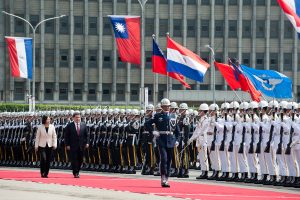Taiwan is one of the few countries to open a representative office in the unrecognized but self-governing Somaliland, and some in Taiwan call the relationship “diplomatic recognition in waiting.” President Tsai Ing-wen called Taiwan and Somaliland “like-minded partners who share the values of democracy and freedom.” But in fact, Somaliland President Muse Bihi Abdi delayed the presidential election that was to occur in 2022, freedom of the press is under threat, and hundreds have died in what has become a civil war.
In February, many countries issued a joint statement to condemn the fighting in Somaliland. The United States government called for “an immediate, unconditional ceasefire and unhindered humanitarian access,” and the United Nations Refugee Agency called for humanitarian aid to assist the over 100,000 refugees that fled the fighting.
Although Taiwanese media have also reported about these developments, legislators seemed uninterested in examining Taiwan’s support for Somaliland’s government.
Recently at the Legislative Yuan, Democratic Progressive Party Legislator Lin Ching-yi asked Foreign Minister Joseph Wu about Taiwan-Somaliland relations. Lin asked about scholarships for Somaliland students, and medical aid for Somaliland, but not a single question about Somaliland’s delayed presidential election, the ongoing fighting, or the human rights situation. In fact, Lin even asked Wu about the possibility of defense cooperation with Somaliland.
Despite the worsening situation in Somaliland, in recent weeks Taiwan government officials went there to meet with Somaliland government officials for the “1st Taiwan-Somaliland Joint Working Group on Energy and Mineral Resources Cooperation Meeting,” and, the Taiwan Representative Office in Somaliland arranged for a business delegation from Taiwan to visit Somaliland government agencies.
In general, legislators from all political parties seem uninterested in the details of how Taiwan maintains its relationships in those countries that have diplomatic relations with Taiwan.
Nicaragua – prior to its termination of diplomatic relations with Taiwan in December 2021 – was a typical example. A report to the United Nations Human Rights Council authored by the Group of Human Rights Experts on Nicaragua determined that Nicaragua’s security agencies had committed crimes against humanity against anti-government protesters in 2018. This occurred shortly after Nicaragua’s army commander-in-chief visited Tsai in March 2018 (he was later sanctioned by the United States). Later in 2018 Taiwan even donated millions of U.S. dollars (supposedly for medical aid) to a police official who was already under United States sanctions.
Honduras is a similar example. In November 2021, the Tsai administration welcomed then-President Juan Orlando Hernandez to Taiwan, shortly before the end of his term in January 2022. Hernandez was already under investigation for drug trafficking and other crimes, and not long after he left office he was extradited to the United States. Surely no one is surprised that current President Xiomara Castro, a political enemy of Hernandez, remembered Taiwan’s friendliness to her rival, and that in March this year she decided to terminate diplomatic relations with Taiwan.
Even though Tsai recently visited Guatemala, and Guatemala President Alejandro Giammattei visited Taiwan, similar events are also occurring there.
Tsai described her visit to Guatemala as necessary to “stand firm in defense of freedom and democracy,” and Presidential Office Spokesperson Olivia Lin described Giammattei’s visit to Taiwan as “bolstering our joint efforts toward global democratic resilience.” However, in recent months the international community has repeatedly expressed concern about the lack of democracy under Giammattei. International human rights organizations criticized the banning of opposition candidates in the upcoming presidential election, and the United States criticized the deterioration of the rule of law and the persecution of journalists.
As for Paraguay, another country that has diplomatic relations with Taiwan, the pattern is repeating itself there too. After Paraguay’s presidential election on April 30, the Ministry of Foreign Affairs congratulated winner Santiago Peña of the ruling Colorado Party (Asociación Nacional Republicana, ANR). Unlike his election opponent Efrain Alegre who said he would end diplomatic relations with Taiwan if he won the election, the expectation is that Peña will maintain diplomatic relations.
However, critics in Paraguay allege that Peña is “is acting as a puppet of party leader and main backer” former President Horatio Cartes Jara. In January this year, the United States Treasury Department announced sanctions against Cartes due to alleged participation in corruption. This followed the U.S. State Department announcement in 2022 that it had designated Cartes and three of his adult children for involvement in significant corruption.
When then-President Cartes visited Taiwan in 2017, Tsai said “she often sees positive comments on social media about good things that President Cartes has done,” while Cartes claimed the friendly relations between Taiwan and Paraguay are based on respect for the common values of democracy, freedom, and human rights.
In Saint Vincent and the Grenadines, another country that has diplomatic relations with Taiwan, media recently reported that Prime Minister Ralph Gonsalves said Taiwan will loan approximately $214 million for infrastructure projects. The finance minister also said that Taiwan will loan $50 million to build a Marriott hotel. The finance minister is the prime minister’s son. What can go wrong?
Taiwan’s challenging diplomatic circumstances do not mean that Taiwan’s legislators should write blank checks for diplomatic efforts. Regardless of which party the president comes from or which parties are a majority or minority in Taiwan’s Legislative Yuan, perhaps it is time for legislators to ask better questions so as to avoid harm to Taiwan’s well-deserved reputation as a democracy where human rights and rule of law are respected.

































